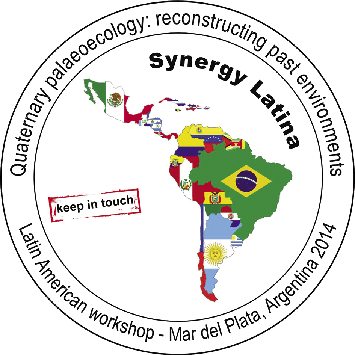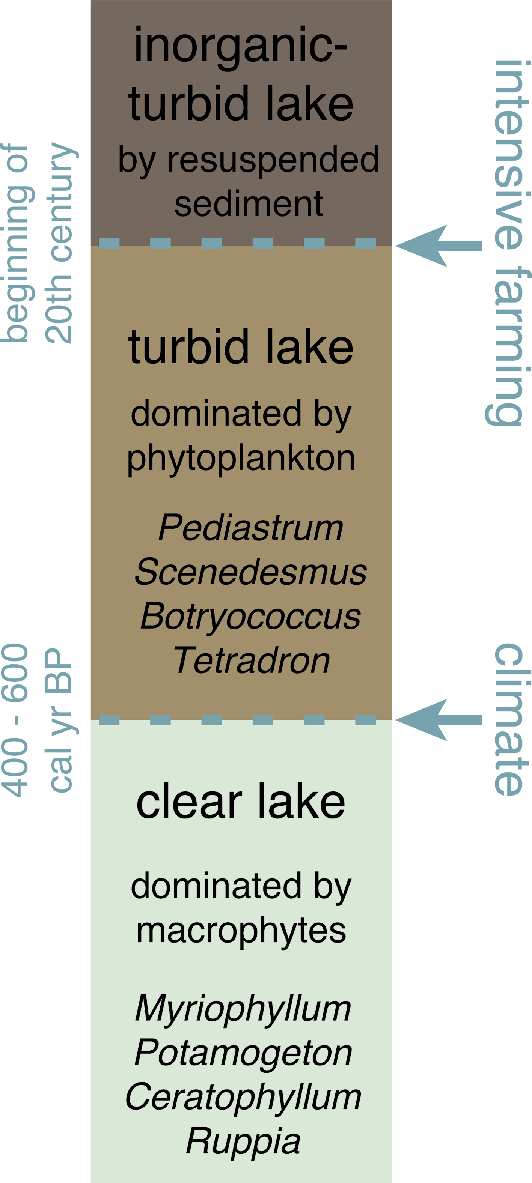- Home
- Publications
- PAGES Magazine
- Quaternary Paleoecology: Reconstructing Past Environments
Quaternary paleoecology: Reconstructing past environments
Sonia L. Fontana and Keith D. Bennett
Past Global Changes Magazine
23(2)
77
2015
 |
Sonia L. Fontana1 and Keith D. Bennett2
Mar del Plata, Argentina, 4-15 August 2014
The 2nd Latin American paleoecology workshop took place at the University of Mar del Plata, Argentina and was attended by 37 participants from Mexico, Ecuador, Colombia, Brazil, Chile, Uruguay and Argentina. This intensive two-week course was designed for postgraduate students and early-career scientists undertaking research in paleoecology, with an emphasis on microfossil analysis. Thus the workshop stimulated the interaction of students and young scientists with a broad range of expertise, including palynology, the analysis of diatoms, ostracods, cladocera, charophytes, plant macrofossils, bryophytes, as well as geochemistry, archeology, and geomorphology.
The course focused on state-of-the-art methodological approaches and techniques applied to diverse paleoresearch issues in chronology and proxy development. The event was organized into different activities: lectures, practical classes, poster presentations, a field trip, and the development of a joint research project. These activities addressed the interaction of different external (e.g. climate variations, human activities) and internal forcing factors (e.g. population dynamics, dispersal, resilience) responsible for ecosystem changes. They also looked at the spatial and evolutionary responses of organisms to long-term climatic changes.
Participants designed a multi-disciplinary research project based on the analyses of sediment cores recovered in shallow lakes of the Pampa region. The cores were described and sub-sampled for different analyses during the course, and the analysis of the samples is now taking place at the participants’ home institutions. Findings from this research will be communicated to all other participants. In this way, we are building a network of young scientists in Latin America: Synergy Latina. The main goal of this particular project is to contribute to the understanding of the regional changes in climate and the environment during the Holocene. Paleoenvironmental reconstructions from the Pampa region are important for understanding this large ecosystem, which has been completely converted into agricultural land, apart from the costal dunes (Fontana 2005). In addition, sediment records from this region also offer the opportunity to look at changes in trophic states of lakes through time (Stutz et al. 2012), applying the ecological theory of alternative stable states of the aquatic systems on long time scales (Scheffer et al. 1993, 2001; Fig. 1). The outcome of this project will contribute significantly to understanding the drivers of pampean lake dynamics on a long-term perspective.
The workshop also aimed to promote social and scientific exchange between research groups from different Latin American countries, while enhancing the skills and knowledge of all of the participants through field, laboratory, and computer exercises. Because the number of applicants far exceeded the available workshop slots, the organizing committee is now considering offering this course on an annual basis.
In addition to the financial support from PAGES, participants obtained support from their home institutions, universities and research councils. A personal grant from the Ministry of Science and Technology of Argentina, Milstein-raíces program, to SLF helped develop the workshop. The 14CHRONO Centre at Queen’s University Belfast, UK, supported the Synergy Latina project by providing radiocarbon dating of the sediment records. We would like to thank Silvina Stutz, Alejandra Marcos and Marcos Echeverria for coordinating the different activities during the meeting. The full program of activities, including abstract presentations can be viewed at: www.uni-goettingen.de/en/413062.html
affiliations
1Department of Palynology and Climate Dynamics, University of Göttingen, Germany
2School of Geography, Archaeology & Palaeoecology, Queen's University Belfast, UK
contact
Sonia Fontana: Sonia.Fontana biologie.uni-goettingen.de
biologie.uni-goettingen.de
references
Fontana SL (2005) J Paleolimnol 34: 445-469
Scheffer M et al. (1993) Trends Ecol Evol 8: 275-279
